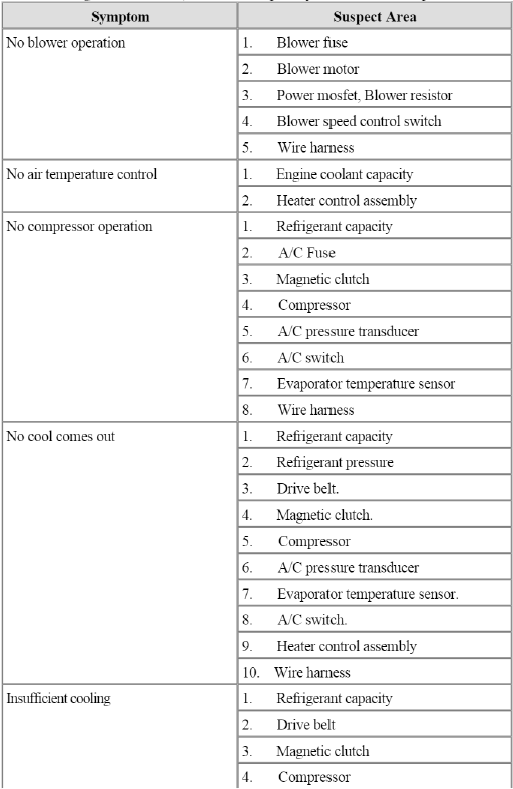Kia Sportage: General Information, Troubleshooting, Special Service Tools
Kia Sportage Third generation (SL) - (2011-2016) - Service and Repair Manual / Heating, Ventilation, Air Conditioning / General Information, Troubleshooting, Special Service Tools
General Information
Specification
Air Conditioner

Blower Unit

Heater And Evaporator Unit

Troubleshooting
Troubleshooting
Problem Symptoms Table
Before replacing or repairing air conditioning components, first determine if the malfunction is due to the refrigerant charge, air flow or compressor.
Use the table below to help you find the cause of the problem. The numbers indicate the priority of the likely cause of the problem. Check each part in order. If necessary, replace these parts.
After collecting the malfunction, check the complete system to ensure that performance is satisfactory.


Special Service Tools
Special Service Tools

READ NEXT:
 General Safety Information and
Caution
General Safety Information and
Caution
Instructions
When Handling Refrigerant
1. R-134a liquid refrigerant is highly volatile. A drop on the skin of your
hand could result in localized frostbite.
When handling the refrigerant,
 Repair procedures
Repair procedures
Refrigerant System Service Basics
Refrigerant Recovery
Use only service equipment that is U.L-listed and is certified to meet the
requirements of SAE J2210 to remove
4FC-134a(R-134a) from t
SEE MORE:
 Smart Cruise Control display and control
Smart Cruise Control display and control
Basic function
You can see the status of Smart Cruise
Control operation in the Driving Assist
mode on the cluster. Refer to "Instrument
cluster"
Smart Cruise Control will be displayed as
below depending on the status of the
function.
When operating
Whether there is a vehi
 Conditions and operation of the front passenger ODS
Conditions and operation of the front passenger ODS
*1. The system judges a person of adult size as an adult. When a smaller
adult sits in the front passenger
seat, the system may recognize him/her as a child depending on his/her physique
and posture.
*2. Do not allow children to ride in the front passenger seat. When a larger
child who h
Content
- Home
- Kia Sportage - Fifth generation (NQ5) - (2022-2025) - Owner's Manual
- Kia Sportage - Second generation (JEKM) (2005-2015) - Body Workshop Manual
- Kia Sportage Third generation (SL) - (2011-2016) - Service and Repair Manual
- Sitemap
- Top articles